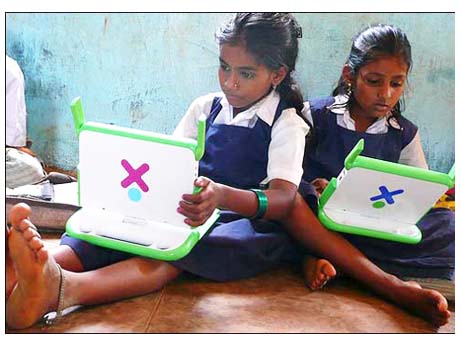
From Indian Express ( Mumbai), a story of a daring experiment in harnessing Infotech to reach out to disadvantages kids Bangalore: Behind the snazzy Greco-Roman blocks of Indus International School, past its riding club and indoor sports stadium, is a clutch of humble buildings, spruced up with Chittara and Yakshagana art, that don’t seem to belong. But step inside and the story is all about belonging.
These classrooms are part of India's first international baccalaureate (IB) school for children from below-poverty-line families in the neighbourhood, which shares not just the sprawling Sarjapura campus of the $35-per-child-per-day international school, but also its curriculum -- up to class V -- at a nominal fee of 7 cents per child per day.
In the Wi-Fi classrooms of the community school that overlooks a pond, well-groomed children in green uniforms type on their Intel Classmate laptops and speak among themselves in whispers -- Kannada, Telugu, Tamil, Urdu, and of late, a smattering of English.
Meena, the class I teacher from Thavyakanahalli, a village less than a km away, says, when they came, they did not understand a word of English and could not even say 'good morning'. Some of them hadn't been to school, most of them came from government schools where they learned nothing.
In nine months, they will be able to speak 'Globish', functional English with a vocabulary of 1,500 words, says Principal Manoj Kumar, who earlier taught the Theory of Knowledge under the IB curriculum at Indus International School. When the parents -- most of them labourers and small-time farmers -- heard them speak halting English at the PTA meet on July 17, some wept with joy, Kumar says.
At a time when private schools in the city have voiced concern about certain clauses of the Right to Education Act and the issue of sustainability -- not to mention the so-called social repercussions, with Bethany High School issuing a circular to parents suggesting that admitting poor children indiscriminately would be detrimental to the psyche of the other students -- Lt Gen (retd.) Arjun Ray, CEO of Indus Trust, which runs international schools in Bangalore, Hyderabad and Pune, has launched an experiment in equal-opportunity, sustainable education.
The Indus International Community School, inaugurated on June 18, 2010 with 300 children -- the poorest of 1,200 applicants were picked -- is based on a one-computer-per-child model where teachers from the local community, trained for eight months in the IB curriculum, facilitate learning. The students, who live within 5 km from the school, are provided bags, books, uniforms, stationery, mid-day meals and transport, besides child-friendly laptops.
"Teachers' remuneration constitutes 70 per cent of the operating cost of a school. If you adopt a peer-tutoring, technology-based model of learning, you can cut costs. Arthur C. Clarke said that if a teacher can be replaced by a computer, then replace him/her. Our community school is a peep into the schools of the future, which will be all about self-learning, with facilitators instead of teachers," Lt Gen Ray says.
The yearly operating cost of Indus International School in Bangalore, one of the leading IB curriculum schools in India, is Rs 1.5 crore ( Rs15 million)a year; by contrast, it costs Rs 10 lakh (Rs1 million) a year to run the community school, which has up to class VI and will add at least one more grade every year. Classes VI to XII will follow CBSE curriculum, but meritorious children who want to switch to IB will be admitted to the mainstream school, says Lt Gen Ray.
"It cost Rs 1,600-1,800 per sq ft to build Indus International School. The community school cost Rs 550 per sq ft. We are now about to start building our next community school in Hyderabad, for which we have planned an innovative structure -- the classrooms will not have any walls -- and roof design, which is expected to cost Rs 150 per sq ft. The idea is to make these schools self-sustainable in the long run. We plan to set up social businesses in each school -- for example, the one in Hyderabad is surrounded by medicinal forest, which can be mined for ayurveda," he says, clarifying that he's not suggesting vocational training for underprivileged children. "They need a chance to go to Harvard and MIT, not to become carpenters," he says.
To cut infrastructural costs, the community school in Sarjapura operates in two shifts of 150 children studying for four hours each, as a result of which there are no summer holidays. "They need 300 days to complete the curriculum, so we have sports and music and extracurricular activities on Saturdays, with senior students from the mainstream school coaching them in games and sports," says Kumar.
Not that anyone is complaining. What the children like best is to Google and Wiki on their laptops and work the class smart-board. "Internet was introduced just a week ago and they've already learnt the ropes," says Bharath, who teaches class VI, where the students are staging a mock gram sabha, with Tulsi as sarpanch and suggestions about solving the water problem in the village pouring in from the rest of the class. Says Anuradha Ghulati, coordinator of the community school, who taught the IB curriculum for class IV at Indus International School, "In a way, they realise the opportunity given to them. Sixty of the students are from the Trust's orphanage. All the students are disciplined, they learn faster, and there is almost no absenteeism."
Source: Indian Express: Link to original story ( Aug 10): http://www.indianexpress.com/news/in-wifi-classrooms-bangalores-poor-catch-up/657507/
Link to MSN Education reprint with lots of pictures: http://education.in.msn.com/news/article.aspx?cp-documentid=4244354